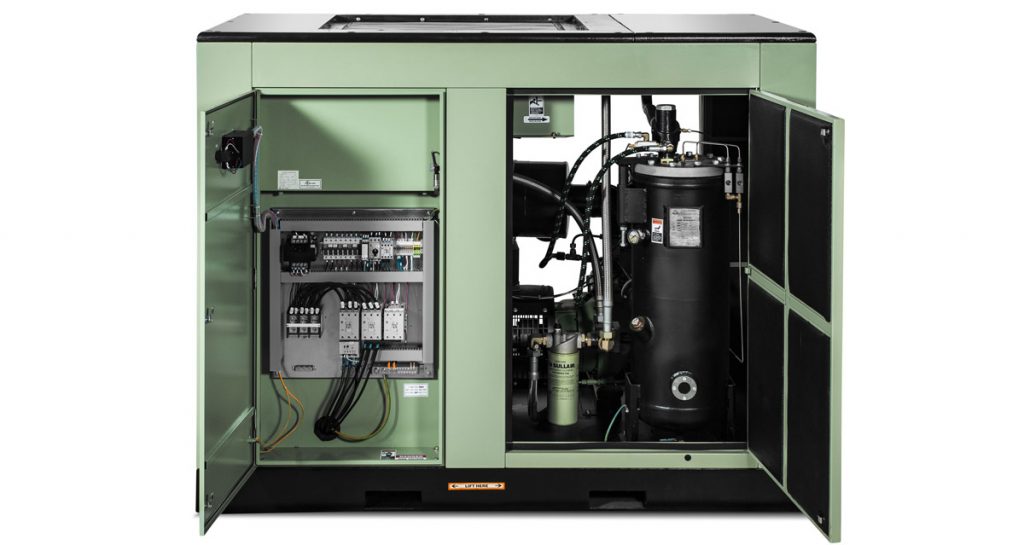October 10, 2019 | Brit Thielemann | Sullair.com
When selecting a rotary screw air compressor, there are two cooling configurations to choose from: air-cooled or water-cooled. Air compressors create a lot of heat during their normal operation. The heat primarily comes from the motor, air end and cooling circuit. Customers need to choose between an air-cooled or water-cooled compressor, and this decision is based upon the size, location and utilities available to the air compressor. Compressing air from 0 to 125 psig creates heat through the “heat of compression” process. A cooling circuit removes the heat from the compressor by a radiator and fan combination (air-cooled) or a shell and tube exchanger (water-cooled).
In the rotary screw market, it is estimated about 80% of compressors are air-cooled, while 20% are water-cooled. Most rotary screw compressors are air-cooled – especially those below 100 hp. Smaller rotary screw compressors, such as those 40 hp and below, are typically only available in an air-cooled configuration. Water-cooled compressors become more common in larger machines, between 125-600 hp.
The reason a customer opts for air-cooled versus water-cooled is based on their environment, space considerations, costs of water cooling and if water is available. The following questions can help you begin to determine which product to choose.
What are the requirements for water-cooled compressors?
If the customer’s environment is caustic or extremely dirty, a water-cooled solution may be the best fit. There are many different designs of cooling towers and each has its advantages and disadvantages. Customer need to consider the initial cost of the tower plus the energy required and maintenance that goes along with cooling tower designs. Customers can also use other sources of cooling water like public supply water, self-supplied well water, river, ocean or lake water. A major consideration when using a natural water supply is the cleanup of the water once it passes through the compressor. Chilled water is also a consideration if the customer has this type of equipment, but typically this is avoided due to the high costs associated with chilled water systems.
What are the requirements for air-cooled compressors?
Air-cooled compressors require adequate amounts of cooling air for the inlet and enough space for discharge. Without enough space, customers may encounter temperature regulation issues which can cause nuisance shutdowns or equipment failures. Ductwork to the inlet and from the discharge typically gets cool air into the compressor package and the discharged hot air can be removed from the plant. In the wintertime, this heat can be directed into the plant to help heat the factory.
Hence, if you have a rather confined space, water-cooled compressors may be a better choice.
How are energy costs affected for air-cooled vs. water-cooled?
Water-cooled units can require less power compared to an air-cooled compressor, but customers should also consider the electrical costs of the cooling system, water and water treatment costs when opting for water-cooled. Once factoring in those expenses, air-cooled compressors are typically more cost-effective.
On the other hand, some customers use the cooling water to preheat plant processes, such as for boilers, to save on gas and heating bills. They then realize savings in that area.
What’s the case for air-cooled compressors?
Considering escalating water costs and regulations, plants have sought ways to decrease their cooling water requirements. Compressed air systems consume a high volume of water to cool the compressed air circuit. Many air-cooled rotary screw compressors have seen design improvements and can accept higher ambient temperatures than in the past. In addition, customers will realize the most savings in terms of reduced water consumption. An air-cooled compressor system typically requires less capital costs, less installation costs and can be put anywhere in the factory setting.
Ultimately, it comes down to a customer’s specific application and location as to whether an air-cooled or water-cooled rotary screw compressor will best serve their needs. After the customer has made these considerations and studied the financial impact with the help of a compressed air expert, they can determine which best suits their facility.

